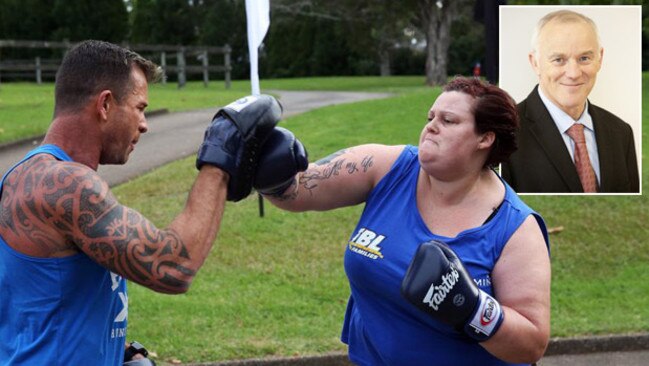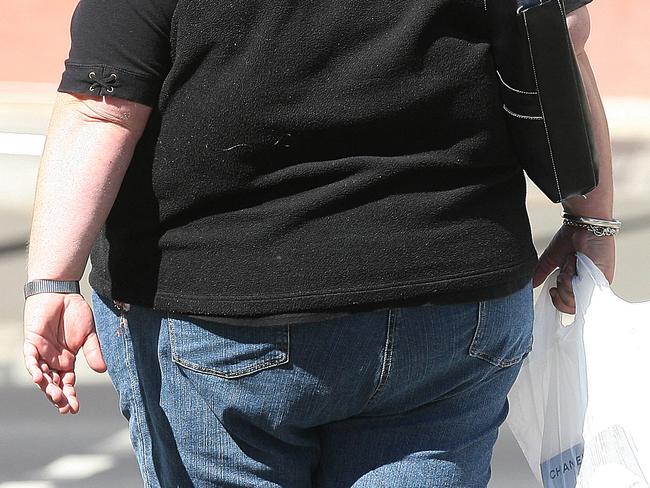Obesity epidemic: The need for more bariatric surgery in public hospitals
A LEADING global weight expert claims slashing the waiting lists for obesity surgery makes economic sense - and our failure to do this is simply prejudice.
National
Don't miss out on the headlines from National. Followed categories will be added to My News.
IMAGINE being so overweight you’re too embarrassed to leave the house. Or so heavy that you are unable to walk even if you want to leave the house. Worse, consider being so big that you end up in a nursing home for care because there’s nothing more that can be done for you in a hospital.
That’s the harsh reality for our nation’s heaviest men and women. Think anywhere between 100kg-200kg or more. They are the clinically obese: people who have so much excess fat they are sick and disabled. They suffer from illnesses such as heart disease, debilitating arthritis and sleep apnoea.
An estimated one million Australians are severely obese yet there are very few services in public hospitals to help them. And waiting lists for obesity surgery are so long many are missing out.
Are you severely obese? Tell us about your experience with the public health system in the comments field below.
Now a leading global expert in obesity and weight loss has slammed the states saying they are “negligent” for failing to do more to reduce public hospital waiting lists for lifesaving bariatric surgery.
Professor John Dixon, who heads the Clinical Obesity Research laboratory at Baker IDI Heart and Diabetes Institute in Melbourne, says the states must do more to speed up the process for those most in need.
“The waiting lists and the barriers that are put up to get bariatric surgery are quite immense. I don’t think it’s anything greater than negligence,” Prof Dixon told News Corp Australia.
“We’ve got over one million people in Australia with clinically severe obesity, and we have a similar number with diabetes, and we put enormous amounts of care into treating diabetes, and almost nothing into treating obesity except for the people that have private health insurance who get some recompense from the Commonwealth through Medicare.”
In 2013-14 there were more than 100,000 Medical Benefits Schedule (MBS) claims — services subsidised by the Commonwealth — related to bariatric procedures. Almost all were in private hospitals and most patients had private health insurance.
Yet the number of clinically obese undergoing bariatric surgery in public hospitals is low across the nation, Prof Dixon said, at a time when the number of patients he sees are heavier than ever.
“In Queensland, the only place you really can get bariatric surgery in the public space is in Brisbane, and there is only a handful done in Brisbane. If you are in Cairns, or McKay or Townsville or in Mt Isa it isn’t going to help you,” he said.

“In Victoria we had waiting lists closed for years because the waiting lists were so long but this is a serious disease. We even have in Victoria examples where patients are referred and they wait — in the case of Austin (Hospital) — a long, long time to get an appointment with a medical doctor who then treats them for at least a year before they even get put on to a waiting list to get treatment.
“At The Alfred they actually put a whole lot of barriers in: they get them to go to an information evening and then they get them to do a program on the internet but at no stage do they see a doctor. It’s an attrition situation.”
Professor Dixon says the states are slow to act on obesity not because of money but because of their perceptions of the obese.
“It has nothing to do with money. Bariatric surgery is cost effective and in people with diabetes it probably saves us money,” he said.
ARE YOU OBESE? CLICK HERE TO FIND OUT
“This has nothing to do with logic it all has to do with the perceptions of being severely obese. The perception is ... that it’s your fault ... that you are lazy, that you are stupid, every perjoritive thing that you can imagine and yet we know that none of that is true. None of it.
“We know that no more can we blame someone with clinically severe obesity for their disease than we can someone with heart disease, most cancers or diabetes. Much of it is genetically primed, much of it is through the way the person is primed in vitro before they are born and what happens in the first three years of life.
“We have this terribly distorted picture where we have a million Australians being neglected. Not all need surgery but they are not even offered it.”
Reality TV shows such as The Biggest Loser were only making matters worse, he said.
“The Biggest Loser is just appalling, it is making fun of people that have serious, chronic illness,” the Professor added.
“They didn’t design that, none of those people on that show planned to be big, they are people that are no lazier, or sillier than others they just have a serious disease, it would have been primed in those people through their parents through pregnancy; in our environment they were going to be big.”

“You can lose weight but you can’t keep it off. They are on such a strict diet that as soon as you take your foot off the pedal and live a normal life the weight will quickly go back on.”
A PricewaterhouseCoopers report developed for Obesity Australia found one in three Australians will be obese by 2025 and the economic impact of their condition will cost the economy $87.7b over the next decade.
Weighing the cost of obesity: A case for action, released this month, found targeted measures including publicly funded lap band surgery could realise up to $840m in net economic benefits by 2025.
Obesity Australia board member Professor Ian Caterson said the states must invest more in public hospital bariatric surgery.
“Bariatric surgery is an effective treatment, particularly for those in the upper grades of obesity and with complications,” Prof Caterson, from the Boden Institute at the University of Sydney, said.

“I don’t think that every hospital should be providing it but it should be a service provided by specialist surgeries.”
But he warned there must be “a redesign in the system so there is a pathway for people with obesity as bariatric surgery alone is not the solution.
“There are very few obesity services in public hospitals, (but) there are plenty of diabetes services and lots of cardiovascular services," he said.
“Bariatric surgery is not just a magic thing that you have and it fixes everything, it still requires discipline and that is one of the problems that state governments are grappling with.”
Attitudes among clinicians also have to change if obesity is to take a stage in the public hospital system, Prof Caterson said.
“Doctors aren’t aware or prepared to change; they say ‘I’m dealing with diabetes or heart disease, I know obesity should be treated but it’s difficult and we don’t have the skills to treat it’,” he said.
“We have to reorganise the pathways and upgrade skills so cardiologists are prepared to be involved in a treatment program that has all the elements needed to provide obesity surgery.”
News Corp Australia approached the Victorian, NSW, Queensland and South Australian governments and asked, what are you doing to reduce waiting lists for bariatric surgery in public hospitals? Their responses are attached below.
Statement from SA Health Department
Statement from NSW Health Minister



